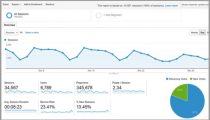
10 Reasons Why Your Website Isn’t Getting Search Engine Traffic
You feel like you’re doing everything right, yet, you’ve never cracked 1,000 unique visitors per month and only a few of your posts are getting search traffic.
If every one of your posts isn’t getting anywhere from a few to a couple of thousand search visits per month, then you’re doing something wrong.
Here are ten reasons why you’re not getting as much search engine traffic as you deserve.
1. Your Site Isn’t Indexed
If your site isn’t indexed, they can’t send you traffic. So, how do you get indexed?
Google (and other search engines) will index your site automatically, but here are a few steps to speed up the process:
- Create an XML sitemap with the Google XML Sitemaps plugin.
- Submit your sitemap to Google through Google Webmaster Tools.
As your site becomes more popular, Google’s spiders will visit more frequently and index your content more rapidly.
2. You’re Not Writing Something that People are Searching For
The first step in writing a blog post is figuring out what people want to know about. Ignoring this step is like starting a business without researching what people want to buy.
If you want search traffic, you need to conduct keyword research. I know I’ve said this before here and here, but being honest with yourself, how often do you actually do it?
It’s your job to create content around the keywords that people are actually searching. To help you figure out which keywords people are searching for, take a look at SEMRush free seo tool.
3. You’re Not Creating Keyword-Focused Posts
Along the same lines, once you know exactly which keywords that people use, you need to create content specifically for those keywords.
During your keyword research, create a list of keywords that are relevant to your audience and that are searched more than 500 times per month. Then write one blog post for every keyword.
When searching for a keyword, we use the free SEMrush keyword tool. All you have to do is search for a keyword, then it will give you all sorts of keyword ideas.
So for example, I seach: best seo tools. It tells me how many people searching for this keyword in Google, what questions they are asking and other related keywords. Then when I create an article, I include these search terms so that everyone is able to find my article easily.
4. You’re Not Putting Keywords in Your Headlines
Your headline is the most important part of your post for getting search traffic.
When you Google something, the keyword that you search is always in the headline, usually in its entirety and near the front of the headline.
So, if you want to start ranking for specific keywords, they need to be in your headline and near the front.
5. Your Posts Aren’t Thorough
Remember, it’s Google’s job to give relevant, high-quality search results. Ideally, the best, most thorough web page for each keyword will always hold the top spot.
For example, if you wrote a 100-word post on the “how to get search engine traffic” while someone else wrote a 3,000-word post that covers every nook and cranny of the topic with authority, Google is going to find a way to put the 3,000-word post at the top and drop yours to the wayside.
Your goal with each and every blog post is to create the ultimate resource for that particular keyword. 2,000-words per blog post is a good rule of thumb.
6. You’re Not Creating Sharable Content
A study by Branded3 confirmed that Google’s search results are at least somewhat based on the number of Tweets.
In the study, they found a direct correlation between the number of tweets and search result rankings. URLs with more than 7,500 tweets, on average, held the 5th spot for their keyword.
This makes sense too. If people are sharing your blog post, that’s a good sign that it’s worth a bump up in the search results.
7. You’re Not Linking Externally and Internally
One way to create an ultimate resource for a particular keyword is to link to other resources within your blog post, both externally and internally.
This does three things:
- It makes your blog post more valuable.
- It makes other content on the subject easier for Google to find.
- I’ve found that one of the best ways to get backlinks is to start by linking to other bloggers.
8. You’re Not Using WordPress
One of the benefits of using WordPress is that it generates easy-to-index pages. If your website is easy to index, then Google will rank it higher.
WordPress is widely considered the best website building platform partly because that’s what all the top online resources are built with. And the people who use it recommend that other people use it.
The key here is to have a well-coded website and WordPress takes care of that for you.
9. You’re Not Optimizing Your Images
Optimizing your images will help your search engine rankings in two ways:
- You’ll likely get traffic through Google’s image search.
- It’s another way to tell Google what your primary keyword is.
Here are the only three ways to optimize your images:
- Save your images as [keyword-phrase.png] before you upload them to your site.
- Add alt text as [keyword phrase].
- Add title tag as [keyword phrase].
If you have any questions about optimizing your images, let me know and I’ll try to help you out.
10. Your Website Is Outdated And Requires a Website Audit
A lot of websites are just old and out of date. Start by doing a SEO audit using SEMrush’s free tool. It will identify all the errors requiring fixing. We recently used this on one of our websites and it made all the difference! See below how this works:
If you want more information about auditing a website for SEO, then read this article.
The Last Word About Getting Search Engine Traffic
Once you fall into the routine of conducting keyword research, choosing a keyword, and pumping out content it’s easy to put too much emphasis on writing for search engines.
Your writing becomes robotic. Just because someone can find it doesn’t mean that they’ll read it and love it.
The reason you need to go through these steps is that it’s the most efficient way to find out what people want to read and to serve it up on an easy-to-find platter.
Read more: ‘10 Article Headline Examples That Got Us 10 Million Readers












Great post Nick!
While these are quite simple things to implement (apart from maybe the keyword research), maybe people seem to forget them or get them wrong all together. It’s nice having a simple and clear checklist to go through before sitting down to write an article, and also to review before it goes live.
It really is all about the keyword research in my opinion. You said it best, ” You’re Not Writing Something that People are Searching For”
Cheers!
Thanks, Ben. How did you decide on the name, “Webrunner”?
Great tips here, Nicholas! Best tip for bloggers though is to write for PEOPLE first and then worry about SEO. Think about what you’re going to write about, then do some keyword research and find a keyword to include in your post and title that goes along with what you wanted to write about.
Thomas
I see SEO and keyword research as a tool to figure out how to help people better than they can tell you themselves. It’s based on real-time data from searches that people do. How do you think this headline (http://www.mobileapptycoon.com/alex-keim-interview/) could be better?
I am a content as marketing plus seo , I always beleive that fresh content can help improve your rankings. Add new, useful content to your pages on a regular basis. Content freshness adds relevancy to your site in the eyes of the search engines. The second is Not only should your links use keyword anchor text, but the text around the links should also be related to your keywords. In other words, surround the link with descriptive text.
I hadn’t heard before that the text around the link matters as well. Thanks for the tip, Ben.
Hi tart
I’m really impressed by this informative article. The problem though is that most of us are not familier with keyword research, please is there any way we can master it better?
And if you’ve submitted your sitemap to the google webmaster tool before, is there a way one can find out if it’s still functional?
Thanks for sharing
Sure thing, Theodore. Go to: https://adwords.google.com/o/Targeting/Explorer?__u=1000000000&__c=1000000000&ideaRequestType=KEYWORD_IDEAS and search for “how to keyword research”. Fill out the CAPTCHA and see the results. Now change the keyword to words that are relevant to your audience and your site…. To check the status of your sitemap, go to http://www.google.com/webmasters/tools/ and log in with your Google account. Anything else?
Great post, thanks
Nice post! I just wish I was getting more traffic with my wordpress, keyword rich posts!!! I have gone the video route, which has seemed to help, but I still have some optimizing to do. Thanks again,
Bryan
Hey Bryan, send me a link to a post and the keyword that you think you should be getting more SEO traffic. I’ll take a look to see if there’s anything I would change.
Some good info for bloggers!
I’ve been guilty of all these early on in my blogging endeavors. I look at some of my really old posts and sometimes wonder why I thought I was doing something awesome lol. But hey, we live and we learn….and we become better.
I’m the same way, Eric. I can’t stand reading some of the posts that I wrote a few years ago. And some of them are downright embarrassing.
Thanks for all this advices,
I will launch a new blog about bags the 1st july, i will use all your advices.
And you don’t talk about :
“building a list” its not important ?
Creat a twitter and facebook fan page
Best
ps : i’m looking for idea of bag content 😉
sorry for my bad english i’m french
Building a list is very important, TBH. It was just outside of the scope of this article. Spend some time on this site reading through the archived articles.
Very nice post. I am in the process of writing my own blog for my website. I am learning the importance of exact keyword matches.
That’s good, Brandon. I struggle with trying to accomplish exact keyword matches while writing compelling, I-can’t-wait-to-click-this headlines. Have you found a good way to balance the two?
Great Tips Nicholas, I am fully agree with your #4 Points. Keyword in Title and URL Is really plays a vital role to get good Ranking on SERP with exact keyword. BTW Thanks for all points.
Now i will give my whole effort on Twitter. Will try to get RT More and More. Thanks.
Yeah, the lesson here, Amit, is that if you have to choose between asking for a Tweet or a Like, a Tweet is likely the better option.
Hey Nicholas,
What are your thoughts on not doing keyword research and trying to build traffic through guest posts, social media, etc. instead?
I think you need to do all three, Austin. One benefit to keyword research is that it’ll help you write guest posts and better understand your audience. It only takes a few minutes and it’s not as complicated as you probably think.
Really good post Nick. Google Keywords is a really good tool. I have one doubt though. In #9 Optimizing your Images, I couldn’t understand points 2 and 3 on how to optimize images. Your help would be really appreciated.
Sure thing, Mr. Technoid. Here’s the exact HTML for the image on this post:
[img width="255" height="125" src="http://incomediary.com/wp-content/uploads/2012/06/Reasons-Why-Not-Getting-Search-Engine-Traffic-255x125.png" class="attachment-post-featured-image wp-post-image hoverZoomLink" alt="9 Reasons Why You’re Not Getting Search Engine Traffic"/]Notice the src=””, alt=””, and it should have a title=””, but since it’s a feature image it’s difficult to add that. All three have/should have the keywords “Reasons Why Not Getting Search Engine Traffic”. Does that help?
Oh! Now I get it. Thanks a lot Nick. Keep up the great posting.
Hi Nick, I’m just a beginner and learning now about WP and creating my own pages and blogs. I love your posts and this one in particular. Clear concise steps, to help me start. Really appreciate the time you put into answering all the questions as well, because I learn from them also. You’re awesome!
Thank you, Van Le-Hugh. It’s always nice to hear that I’m helping someone. I’ve found that it’s a lot more challenging to get something done when you’re not sure if there’s meaning behind it. Please let me know if you have any specific questions along the way.
great posts..with a lot of useful info! I will take all of this into consideration. I’m happy to hear that wordpress is a + as i am currently making the switch from blogger to wordpress!
While its good to get some good traffic from search engines, you should not base your business on SE cause google might take you out of business without telling you.
Sheyi
i know it’s really good but can you build a blog pot with out a mailing list and how can i do it since it so costly to have one in uganda ?
can google optimizer have a good impact on making a blog?
Hi Nicholas
Another useful addition to the list is to post consistently on your blog.
I see a lot of people who are sparadic and then wonder why they don’t get traffic.
Hi Nick,
I have this question: when I figur out a word or a phrase by Google Keyword Tool there are 3 specifications: competition, global monthy searchers and local monthy searchers. When I want to choose a word what of these 3 I schould take into consideration. What is the most important for search engines ?
Best wishes,
Teresa
Hey Teresa. If you want to rank organically for a keyword, focus on the global monthly searches. Competition is based on the paid search listings, however, it’ll give you some idea to how much competition there is for the organic listings. I think “local” is within your country. Not sure though. A good way to think about it is, if 1,000 search for a keyword and you can manage to get the top spot, the majority of those 1,000 people will click through to your site every month. Does that help?
Yes !!! Thanks Nick
Re point 6, Nick, was wondering what you recommended as a plugin for retweets. I once added a plugin which half killed my loading time. Got any recommendations?
Cheers
Nic
For a few of my sites, I use the Easy Twitter Button. But whenever possible I try to hard-code them into the theme which drastically cuts loading time: http://www.wpbeginner.com/wp-tutorials/how-to-add-twitters-official-tweet-button-in-wordpress/
Hi Nick,
The information its helpful, to be implement shortly.
Thanks for this great post.
Nice post. I found it very useful
hello nick i have been been following your post for some months now and it has helped me a lot, i would be eternally grateful if you could look at my blogs and give me your thoughts, http://www.tatafonaija.blogspot.com , http://www.jandedjobs.blogspot.com .thanks
Hey Meshackhart, I’m glad I could help. My first thought was that I would never normally click on those links because they’re not self-hosted on your domain (i.e. Tatfonaija.com). Then, once I got there, all I could see was ads. If I came to your site I would leave immediately. Setting up your sites, probably on WordPress, with your own domain is the first step. Then, take off all of your ads. Are people clicking on your ads?
Great post Nicholas,
I was wondering how many times should your keyword show up in your post? For example a 1000 word post, how many times should it show up? Is there a percentage or a rule of thumb to work by?
Cheers
Hey Troy, Sune just asked the same question. The rule of thumb is 2-5% keyword density. So 20-50 times for a 1000-word post. That may sound like a lot, but it’s not. Like I told Sune, focus on writing for humans. I have no idea what keyword density I use for the posts I write.
Great post Nick!
I was just wondering about point 3 (creating keyword-focused posts)… In your opinion, how many times do you think a keyword should be used in a post? Lets say, per 300 words?
Thanks, Sune. 2-5% keyword density is commonly cited. But don’t focus on that. Write for people because Google’s job is to rank for people.
Very interesting article. Thanks!
(The red asterisks behind Name and Email that indicate these fields are required are flush right.)
Appreciate all that you share in your blog!!
Great advice love the post wish I could get more people to my website hotelcitydeals I need a lot more work. Never had a bad day in my life.
Really needed this. Thank you. Working on my sitemap now… Feels like I’m learning a whole new language…
Wonderful post their Nicholas! That was very informative. If you really want to have a huge amount of traffic in your website, it’s all about the strategy 🙂
Hi Nicholas. Your post is very useful. My website has ranked well in search engines on some interesting keywords and it has about 22 pages. The search engine queries and the traffic are very low in the last one month. There is a mismatch between the kind of keywords I am ranking, SERP scores and the number of search queries. My site is fairly new and started getting favorable SERP scores only a month back. is there a time gap between getting good SERP rank on relevant keywords and actual traffic (and queries)? Should I wait or did I miss something?